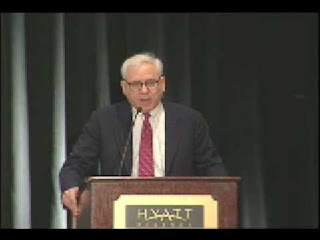Carlyle Group cofounder David Rubenstein cited the need for Alaska to start an investment fund to attract development.
Alaska is going to need to help itself (with development). U.S. leaders as a whole need to recognize the importance of the Arctic for resource development and economic strength, said David Rubenstein, co-founder of the $107 billion global asset management company, the Carlyle Group, and husband of Alaska Dispatch publisher Alice Rogoff.A likely source is the $40 billion Alaska Permanent Fund. Rubenstein scours the world looking for government funds, regulatory preferences, direct subsidies and tax advantages. Rubenstein helped make Libya's Gadhafi a stand up guy, while investing part of the Libyan Investment Authority's $35 billion.
The U.S. needs to do much more "to get us in the game," Rubenstein said, noting that Russia has become the major player in Arctic. The U.S. would do well to cooperate with Russia when it comes to developing the Arctic, he said.
The state, currently flush with surplus revenue thanks to high oil prices, could use its wealth to create an "Arctic sovereign fund," attracting investors, especially if it provided incentives and favorable terms, Rubenstein said.
"Alaska can't wait for the federal government," Rubenstein said. "It needs to do some things on its own."
Three years ago, Rubenstein encouraged Alaskans to line up at the federal till. Now he wants Alaskans to create a till of their own, with maybe a few billion from the Permanent Fund. A former lawmaker cited how the fund would help:
"One of the problems Alaska has had is the dearth of capital for projects and trying to explain Alaska to Outside investors is exceedingly difficult."Funny, Carlyle's Rubenstein knows Alaska extremely well, profiting on the backs of Alaskan natives.
In 1984, a law was passed allowing native corporations in Alaska—that is, Eskimo owned companies created by Congress to manage native lands—to sell their losses to businesses looking for tax write-offs. The Marriott executives, working with David Rubenstein at Shaw Pittman, discovered the Eskimo clause and vigorously bought the losses to offset gains. The adventure has become known in some quarters as the Great Eskimo Tax Scam.This history is ignored by America's private equity underwriter (PEU) fawning society. Numbers have to make sense to PEU's, i.e. government subsidies, otherwise multibillionaires pull the plug. Someone has to guarantee their 30% annual returns.
